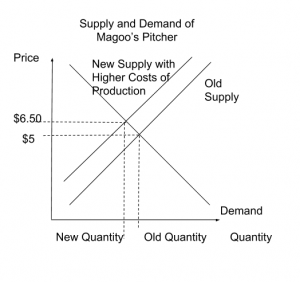Recently I logged onto Facebook to be greeted with a new page named, “Boycott Magoo’s.” Magoo’s is a local college bar, famous for five dollar pitchers of beer that University of Puget Sound students would flock to go buy on Thursday nights. Recently however, Magoo’s has decided to increase their prices by $1.50 so that a pitcher now costs a hefty $6.50. Students appalled by this stormed to social media to take action and posts followed such as the following which was found on the Facebook page by a fellow student, “Magoos has begun what will be their long reign of tyranny if nobody takes a stand. No longer serving $5 pitchers, Magoos believes they can step all over us. We must unionize comrades!” Their plan now instead of Magoo’s this Thursday, is to attend Dirty Oscar’s Annex (DOA) another local bar that offers $2 well drinks.
So why did Magoo’s raise their prices? Answering this question from an economic standpoint offers us two likely cases. First is that the costs of production increased, this could be that the resources they are buying went up or more likely the cost of labor is rising. When the cost of production rises, the supply curve shifts back leading to higher prices and less quantity being bought and sold.
There is another story that could be told as well. This is that Magoo’s is looking to increase their total revenue. When a good is inelastic it means that a percentage change in price leads to a relatively small percentage in quantity demanded. When a good is elastic, the same percentage change in price leads to a larger change in quantity demanded. Magoo’s might have believed that their pitchers of beer were inelastic, so that they could charge a higher price and gain more revenue, selling at a higher price to more than offset the few customers lost. Instead though, Puget Sound students seem to show that their good is in fact elastic, so that this higher price is overshadowed by the loss in customers.
A good is often elastic if there are many substitutes. In this case a pitcher of beer from Magoo’s has many substitutes; as students pointed out, one convenient substitute are the $2 well drinks from DOA. DOA, a Guy Fieri approved bar on Sixth Avenue, will now experience an increase in their demand for drinks. Since Magoo’s pitchers are a substitute for DOA well drinks, as the price of pitchers goes up, demand for DOA drinks will shift up. Students are now deciding to switch from pitchers to well drinks due to Magoo’s price increase.
The Facebook page encouraging other students to make the switch to DOA highlights the network effect that takes place in bars. This effect explains the added values consumers get from others consuming the same good. People go to bars not just for drinking, but for the social environment as well. So the network effect takes place since the more people who are in the bar, the higher the value of being at the bar. The “Boycott Magoo’s” page is aiming for more people to go DOA so that DOA becomes more fun for themselves. If enough people switch to DOA, then a “critical mass” can be met. Once a critical mass is reached, DOA will be able to attract more customers based off of the value of their existing network. Let’s see tonight how this will all play out as Puget Sound students head out for their Thursday activities. From the looks of it, DOA will enjoy an increase in demand, while Magoo’s may find desolate.



Ellen you have outdone yourself! Very informative and descriptive!! I will most certainly be going to DOA because I am now a more informed consumer!
This is truly quality content.
+1
+1
I heard a rumor Magoos was going to lower the prices of their pitchers again. Do you think everyone will go back to Magoos if the pitchers are more reasonably priced?
True dynamic game. Has Magoos lost the goodwill of its consumer base? Will students believe that Magoos will keep prices reasonable in the future, or will they be wary that the price drop is only temporary?
+1